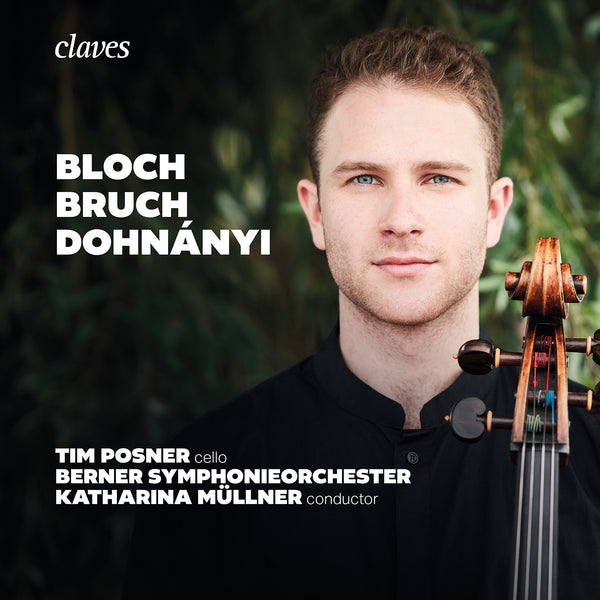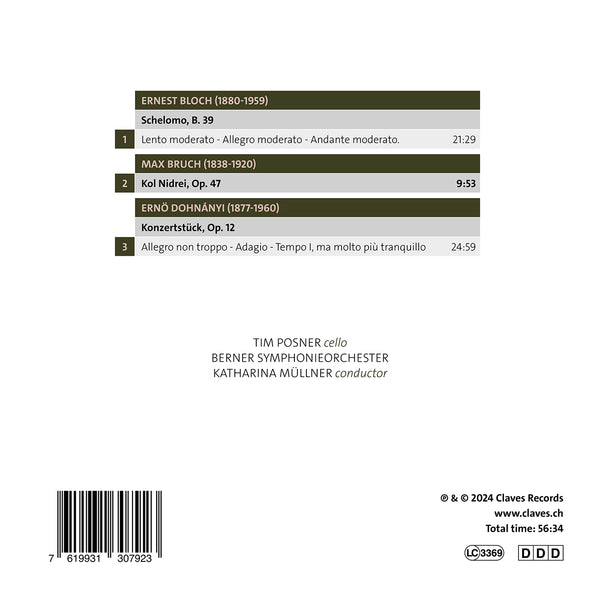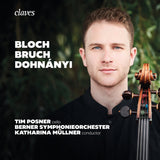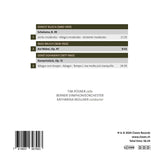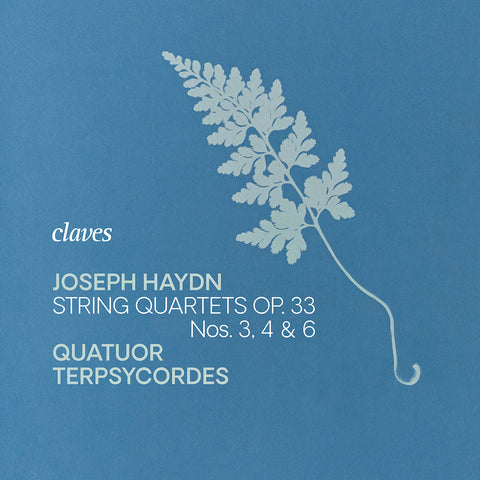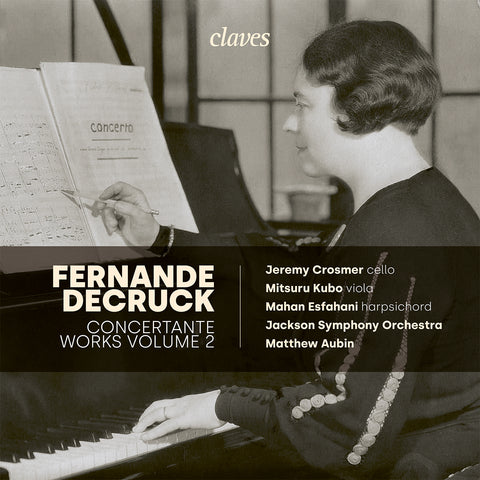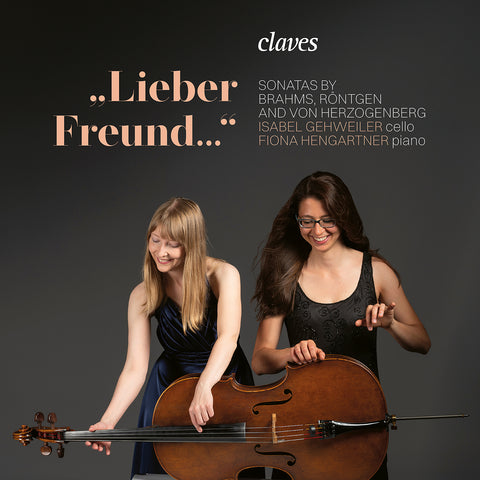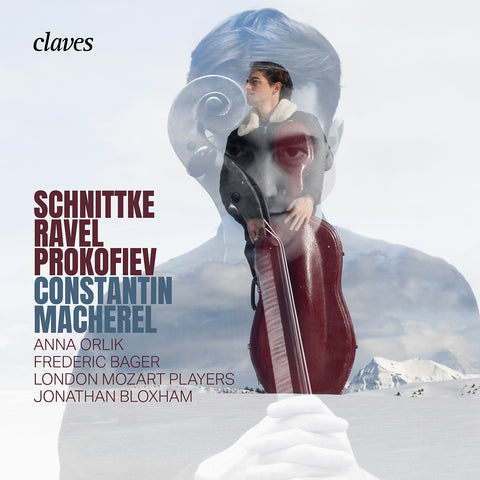(2024) Bloch, Dohnányi, Bruch: Tim Posner, Berner Symphonieorchester, Katharina Müllner
Category(ies):
Instrument(s): Cello
Main Composer: Various composers (see collections)
Orchestra: Berner Symphonieorchester
Conductor: Katharina Müllner
CD set: 1
Catalog N°:
CD 3079
Release: 15.03.2024
EAN/UPC: 7619931307923
This album is now on repressing. Pre-order it at a special price now.
CHF 18.50
This album is no longer available on CD.
This album has not been released yet. Pre-order it from now.
CHF 18.50
This album is no longer available on CD.
CHF 18.50
VAT included for Switzerland & UE
Free shipping
This album is no longer available on CD.
VAT included for Switzerland & UE
Free shipping
This album is now on repressing. Pre-order it at a special price now.
CHF 18.50
This album is no longer available on CD.
This album has not been released yet.
Pre-order it at a special price now.
CHF 18.50
This album is no longer available on CD.
CHF 18.50
This album is no longer available on CD.
BLOCH, DOHNÁNYI, BRUCH: TIM POSNER, BERNER SYMPHONIEORCHESTER, KATHARINA MÜLLNER
>> Winner Thierry Scherz Prize Sommets musicaux de Gstaad 2023 <<
THE WARMTH AND POWER OF THE CELLO
Like many musicians, Tim Posner was born into a musical environment. His father is was a violist, and his mother, a cellist, “quite naturally” became his first teacher. Apart from a passing desire to embark on a career as an opera singer – which even led him to play the shepherd boy in Tosca at the Royal Opera House, Covent Garden! – the prospect of a life dedicated to the cello became clear from the age of thirteen, fuelled in particular by his early discovery of the infinite field of chamber music. After studying at the Junior Department of the Royal Academy of Music, Tim Posner crossed the Channel at eighteen to join Leonid Gorokhov’s (winner of the First Prize at the Geneva competition in 1986) prestigious class at the Hochschule für Musik in Hanover at the age of eighteen. In addition, he regularly benefits from Steven Isserlis’ wisdom during masterclasses, which proved to be a decisive source of inspiration. He has since enjoyed a flourishing career, dividing his time between engagements as a soloist and chamber musician. In 2010, he founded the Teyber Trio with Tim Crawford and Timothy Ridout, with whom he is still active. He has also recently been appointed principal cello of Amsterdam Sinfonietta.
Following Tim Posner’s recording debut of a Concertante by the English romantic composer Cipriani Potter (with the BBC National Orchestra of Wales), this is his first major recording. Ernest Bloch’s Schelomo was the piece that stood out and around which the whole programme was built. “It’s a work that I’ve loved since childhood, and that I’ve always wanted to play, but as it requires a large-scale orchestra, the occasion never arose, so it’s a fantastic opportunity to finally be able to fulfill this dream here alongside Katharina Müllner and the Berner Symphonieorchester. Max Bruch’s Kol Nidrei, another work with Hebrew resonance, was a natural choice. To follow in the footsteps of these two composers, we could have added Erich Wolfgang Korngold’s Concerto, the work of a magnificent musician who had to flee Europe because of his Jewish origins. However, I preferred to opt for contrast and originality by following the suggestion of a friend who introduced me to Ernö Dohnányi’s underplayed Konzertstück. This jubilant work could not offer a more striking counterpoint to the tragedy of Schelomo.”
Ernest Bloch, a composer and violinist born in Geneva, studied with his compatriot Emile Jaques-Dalcroze, Eugène Ysaÿe in Brussels and Claude Debussy in Paris. After moving to the United States in 1916, he became the first head of the Cleveland Conservatory four years later before taking over as director of the San Francisco Conservatory. His music is strongly influenced by his Jewish culture, which he considered the only source for “producing alive and meaningful music”. Schelomo is one of the emblematic works of this legacy. The work was composed in the early months of the composer’s new American life. Bloch says he originally conceived the idea of translating passages from Ecclesiastes in which a preacher likened to Solomon (Schelomo) would develop a meditation on the theme “all is vanity”. With his poor command of Hebrew and his dissatisfaction with adaptations of the poem in Western languages, the composer finally decided to entrust the preacher’s voice to the warm, low tones of the cello. This piece of great instrumental and expressive density was first presented to the public on 3 May 1917 in New York by Hans Kindler and the Philharmonic Orchestra conducted by the composer, who also gave his “Israel” Symphony during the same concert. [..] - Antonin Scherrer
TIM POSNER
Winner of the Thierry Scherz Prize at Sommets musicaux de Gstaad 2023, Tim Posner is also the first British cellist to have been awarded a prize at the International Karl Davidov Competition. Born in 1995, Tim has performed as soloist with orchestras including the NDR Radiophilharmonie, Royal Philharmonic Orchestra and the London Mozart Players with conductors such as Andrew Manze.
Tim recently made his debut concerto CD with the Bern Symphony Orchestra, recording works by Bloch, Bruch and Dohnanyi.Other recent highlights include a recording of chamber music by Boccherini with Steven Isserlis, a recording of Cipriani Potter’s Concertante with the BBC National Orchestra of Wales, the IMS Open Chamber Music tour and a recital debut in the Concertgebouw.
As a chamber musician, Tim plays in various ensembles and in 2010 founded The Teyber Trio with violinist, Tim Crawford and violist, Timothy Ridout, with whom he continues to perform internationally. He has performed at chamber music festivals including the Classiche Forme, Hindsgavl, IMS Prussia Cove (Open Chamber Music), Molyvos International Music Festival, Kronberg Chamber Music Connects the World, Musikdorf Ernen and Cheltenham festivals. As a chamber musician he has collaborated with musicians such as Steven Isserlis, Sir Andras Schiff, Gidon Kremer, Lars Vogt, Emmanuel Pahud and Beatrice Rana.
Tim is principal cellist of Amsterdam Sinfonietta.
Born in 1995, he began playing the cello at the age of eight, studying with his mother, Julia Desbruslais and subsequently with Robert Max. He then studied in the ‘Solo Class’ of Prof. Leonid Gorokhov at the Hochschule für Musik in Hanover. He draws great inspiration from masterclasses with Steven Isserlis at Prussia Cove.
KATHARINA MÜLLNER
Katharina Müllner studied conducting, music education and psychology / philosophy in her hometown of Vienna.
After graduating, she joined Landestheater Linz as an accompanist with conducting commitments, and conducted productions such as Die Entführung aus dem Serail and Il matrimonio segreto, as well as operettas and concerts for young audiences. She also appeared at Chemnitz Theatre with Die Zauberflöte and at Aachen Theatre with Roméo et Juliette.
In 2020/21 Katharina Müllner gave successful debuts at Theater St. Gallen with a new production of Die Zauberflöte, at Vienna Volksoper with Suppès Der Teufel auf Erden and Britten’s Death in Venice. Other conducting engagements took her to Deutsche Oper am Rhein, Kammeroper Wien, Robert Schumann Philharmonie Chemnitz and Wuppertal Symph-ony Orchestra. At German National Theatre in Weimar she conducted the premiere of Carmen.
2022/23 brought Katharina back to Deutsche Oper am Rhein for the new production Krabat as well as to Theater St. Gallen for the revival of Die Zauberflöte. Theater Essen invited her for Carmen and she stood in at short notice for Così fan tutte (directed by Kirill Serebrennikov) at Komische Oper Berlin. She received invitations from the Wuppertal Symphony Orchestra, Coburg Philharmonic Orchestra, Brandenburg Symphony Orchestra and SWR Symphony Orchestra Stuttgart.
In 2023/24 Katharina Müllner will conduct the premiere of the ballet Der 35. Mai oder Konrad reitet in die Südsee by Raphaël Coumes-Marquet and Gordon Kampe at Semperoper Dresden. She will also return to the Deutsche Oper am Rhein for the premiere of A Kiss to the World by Dominique Dumais as well as the revival of Krabat. In addition to her opera engagements, she is scheduled for symphonic performances with Staatsphilharmonie Nürnberg, Stadttheater Klagenfurt and Düsseldorfer Symphoniker, among others.
BERN SYMPHONY ORCHESTRA
The Bern Symphony Orchestra (Berner Symphonieorchester) looks back on 145 years of tradition as the orchestra of the Swiss capital. Founded in 1877 as the “Bernischer Orchesterverein”, the BSO is one of the largest and most important orchestras in Switzerland with around 100 musicians from over 20 different nations. Since 2011, it has been operating as a part of the city’s opera, theatre, and ballet performing arts organization, know as “Bühnen Bern”, while maintaining its artistic independence. The BSO performs more than 50 concerts per season in addition to the musical theatre performances at Bühnen Bern, which have been under the musical direction of Nicholas Carter since 2021.
The principal conductors of the Bern Symphony Orchestra were, most recently, Conductor Emeritus Mario Venzago for more than a decade, and before him Andrey Boreyko, Dmitrij Kitajenko, Charles Dutoit and Paul Klecki, among others. Renowned guest conductors such as Sir Neville Marriner, Eliahu Inbal, Susanna Mälkki, Jaap van Zweden, Santtu-Matias Rouvali, Simone Young, Klaus Mäkelä, Mirga Gražinytė-Tyla and James Conlon have left their mark on the orchestra. The BSO currently operates without a principal conductor and works with a large number of renowned guest conductors.
World-class soloists such as Sol Gabetta, Hilary Hahn, Jean-Yves Thibaudet, Daniel Barenboim, Frank-Peter Zimmermann, Martha Argerich, Pierre-Laurent Aimard, Emmanuel Pahud and Fazil Say, as well as young classical stars such as Kian Soltani, Regula Mühlemann, Vilde Frang, and Alexandre Kantorow, contribute to spreading the reputation of the Bern Symphony Orchestra far beyond the country’s borders. This leads to regular invitations at home and abroad.
In addition to the symphonic repertoire there is also focus on the promotion of contemporary composers. The orchestra reaches a wide audience with diverse formats such as family and toddler’s concerts, as well as concerts in the region. A special highlight of each season is the open-air concert on the Bundesplatz and the crossover concerts with popular music artists in “Über ds Chrüz”.
The management structure of the orchestra is strongly democratic. Program planning and artist invitations are the responsibility of the concert commission, which consists of elected members of the orchestra.
REVIEWS
"This "rhapsodie Hebraïque", as Bloch termed it, is paired with a tender and again sensitive playing of Bruch’s Kol Nidrei, the Protestant composer’s interpretation of the historic invocation to forgive sins on the eve of Yom Kippur, commissioned by the Liverpool Jewish Society in 1880. It’s lyrical, rich and expressive, and done with a tenderness, but never sentimentality, that gives it the intended meaning. The final piece on this recording turns to (marginally) more upbeat matters with Dohnányi’s Konzertstück, its initial lightness given flight from the beginning by Posner and the Bern Symphony. The finale is spun out on an ethereally tensioned thread of distant timpani, oscillating cello and the Bern strings. Very much recommended." - Sarah Urwin Jones, May 2024
"Pièce virtuose un rien bavarde alla Richard Strauss, le Konzertstück (1904) d'Ernö Dohnanyi voisine avec le Schelomo (1916) d'Ernest Bloch, sous-titré « Rhapsodie hébraïque». La culture juive a également inspiré Max Bruch pour son Kol Nidrei (1880) qui a la particularité d'avoir incité Schönberg à composer sa pièce homonyme en réaction à une « sentimentalité» que le Viennois réprouvait. Tim Posner tient le pari de restituer son programme avec une sobriété expressive, une clarté de diction et une noblesse de ton susceptibles d'en rendre le propos plus universel. La tendresse orante de Kol Nidrei ne s'encombre ici d'aucune lourdeur, pas plus que l'intense méditation de Salomon ne tourne à la déclamation expressionniste. Sans égaler l'intensité émotionnelle des Casals, Tortelier, Starker, Navarra, Fournier, Nelsova, Rostropovitch ou Du Pré, le violoncelliste solo de l'Amsterdam Sinfonietta propose néanmoins une alternative légitime. Dans le Konzertstück où la concurrence se fait moins rude - quoique Starker.. - , Posner déroule avec la même légèreté de touche une lecture au lyrisme élégant." - Gérard Belvire, June 2024
"Tim Posner, already a prize-winner, needs only two things to make a notable impression – his cello and his musicianship, and here both are in tip-top order. In this performance, the expression of Ernest Bloch’s Schelomo comes from within – immediately given Posner’s arresting plangent tone and throughout with his unforced intense phrasing, judiciously detailed by the Berne Symphony Orchestra and Katharina Müllner, who know exactly where the climax is – arrived at with certainty and fired-up with cinematic relish. In Max Bruch’s exquisite if soulful Kol Nidrei, Posner is tender and intimate, subtly beguiling too, and leaves no doubt as to the cellist’s sensitivity. Ernö Dohnányi’s Konzertstück may prove to be the revelation of this release, a gorgeously lyrical opus, lightly Brahmsian, vernal, which Posner plays with much affection and invests numerous varied hues and intensities into the expressive and captivating twenty-five-minute whole, complemented by fine woodwind and horn solos. Excellent and well-balanced sound on Claves CD 3079. I look forward to hearing Tim Posner again." April 2024
“[..] These are loving performances from Posner. He has tremendous tonal beauty across his cello’s range, making it sing with hugely attractive mellow, melancholic passion. Katharina Müllner and the Berner Symphoniker are equally warmly expressive. [..]” - Charlotte Gardner, June 2024
"Avec cet album riche en univers lyriques, Tim Posner signe bien plus qu’une carte de visite : il fait la démonstration d’un talent déjà affirmé. L’Orchestre symphonique de Berne, en belle forme, est mené par la baguette attentive de Katharina Müllner (°1992), qui a étudié la direction d’orchestre, mais aussi la philosophie et la psychologie, à Vienne, sa ville natale. Cette jeune cheffe, autre belle découverte de l’album, s’est déjà vu confier des opéras de Mozart, Suppé, Britten ou Bizet sur des scènes suisses, autrichiennes et allemandes. Sa carrière, comme celle de Tim Posner, est à suivre." - Jean Lacroix, May 2024
"Composé par un Dohnanyi de vingt six ans, le plus rare Konzertstück (1903-1904) est le joyau de l’album. Janos Starker (avec Susskind chez Emi puis Schwarz pour Delos/ Naxos) ou Raphael Wallfisch (avec Mackerras pour Chandos) en ont laissé d’ardents témoignages. Cette nouvelle version pourrait bien s’imposer comme une référence moderne, tant elle exprime avec soin le lyrisme généreux d’une partition plus viennoise que hongroise. La construction rigoureuse, déguisée sous des atours rhapsodiques, est parfaitement comprise par le soliste comme par la cheffe Katharina Müller. Le phrasé impeccable de Posner y installe des moments d’une rare élégance." - Michel Stockhem, May 2024
"Belebte Brocken Mit Tim Posner (28) und Katharina Müllner (31) treten hier zwei aufstrebende Musikschaffende ins Rampenlicht. Der britische Cellist und die Wiener Dirigentin beleben mit dem Berner Symphonieorchester drei wuchtige kompositorische Brocken der Spätromantik: Ernest Blochs «Schelomo» und Max Bruchs «Kol Nidrei» stellen sie das kaum bekannte «Konzertstück op. 12» des Ungarn Ernö Dohnányi gegenüber. Faszinierend." - Frank von Niederhäusern, February 2024
"The three works each have other recordings. Consider two discs on Hyperion. Natalie Clein plays the Bloch and Bruch pieces, and Bloch’s two other cello works (review). Volume 1 of the Romantic Cello Concerto series, with Alban Gerhardt as the soloist, includes Dohnányi’s Konzertstück and pieces by Enescu and D’Albert(review). But I suspect this issue might be a unique programme, and its main purpose is to announce its soloist. Comparisons are less meaningful when each performance here is good, to say the least. The recording is good, while it slightly favours the cello in the balance. (Those who ask for a “concert hall balance” on disc like this have not spent much time listening live to cello concertos in a large hall.) The notes, far from extensive, say something about Dohnányi the composer but nothing about his composition. They are useful for the Bruch and Bloch pieces." - Roy Westbrook, May 2024
"This unusual programme works very well indeed, and with superb performances all round, it is an admirable addition to the cello catalogue. Tim Posner is certainly a name to look out for and I am sure he will appear again, hopefully with an equally imaginative approach to the choice of music." - Previous review by Dominy Clements, March 2024
"Es ist nicht selbstverständlich, dass sich ein junger Solist und ein traditionsreiches Orchester lückenlos übereinstimmend in die Tonsprache von drei grundverschiedenen Komponis ten einfühlen, verdienen der Cellist Tim Posner und das Berner Sinfonieorchester unter der Leitung von Katharina Müllner in drei konzertanten Werken von Ernest Bloch, Max Bruch und Ernö Dohnányi grosse Beachtung. Knüpften der ungarische Komponist in seinem spätromantischen Konzertstück op. 12 und Max Bruch in «Kol Nidrei, Adagio für Violoncell mit Orchester und Harfe nach hebräischen Melodien» unüberhörbar an ihr Vorbild Brahms an, ging Ernest Bloch in «Schelomo (Solomon) Rhapsodie hébraïque» (1916) eigene Wege. Er drückte die weisen Gedanken und Klagen des Königs Salomo in der Cellostimme unter Anlehnung an die Betonungen in der hebräischen Sprache aus. Am speziellen Klangkolorit verschiedener Kulturen interessiert, schrieb Bruch sein auf einem aramäischen Gebet basierendes und von vielen jüdischen Komponisten bearbeitetes Erfolgsstück «Kol Nidrei» für die Liverpool Jewish Society, die offenbar nicht von seinen antisemitischen Äusserungen wusste. Das zu den bekanntesten Synagogalmelodien zählende Gebet interpretieren Tim Posner und die Berner Sinfoniker mit der erforderlichen Inbrunst." - Walter Labhart, October 2024
"This is Posner's debut album, on which - it is by no means a given - he could count on the Berne Symphonieorchester, well-equipped for this programme, led by an inspired Katharina Müllner. And Posner? He might yet grow into a Truls Mørk, and by the sound of it, he is already well on his way... The Konzertstück (its playing time is around half an hour) makes this release highly recommended!" - Aart van der Wal, March 2024
"Le Prix Thierry Scherz 2023 voit son disque enrichir le catalogue Claves, lequel se dote chaque année de quelque quinze nouveaux titres. L’héroïsme de la maison suisse parvient à tenir la dragée haute aux majors du disques. Avec ses moyens et son ingéniosité entrepreneuriale et éditoriale, Claves alimente un secteur malmené économiquement avec des parutions originales et en mettant en évidence des artistes dignes d’intérêt, à l’instar des jeunes lauréats des Sommets musicaux. A cette enseigne, le violoncelliste Tim Posner signe aux côtés du Berner Symphonieorchester emmené par Katharina Müllner un enregistrement consignant des pages célèbres de Bloch (Schelomo) et Bruch (Kol Nidrei) que complètent celles plus rares du Konzertstück, op.12 d’Ernö Dohnányi. Pas encore trentenaire, le jeune musicien qui peut se targuer d’avoir joué avec Sir András Schiff, Gidon Kremer, Lars Vogt et Emmanuel Pahud, et qui a suscité enthousiasme et admiration dans nos alpes suisses aussi bien à Gstaad qu’au Festival d’Ernen, s’imprègne du caractère rhapsodique mâtiné d’orientalisme et de postromantisme de Bloch. Il en restitue l’esprit avec générosité, qualité qu’il convoque également dans les pages romantiques de Bruch et du hongrois Dohnányi." - Bernard Halter, April 2024
"The final work is a rarity, Dohnányi’s large-scale Konzertstück playing out like an extended single-movement cello concerto lasting 25 minutes. It’s music on the cusp (Dohnányi completed it in 1904), showing the influence of Brahms and Mahler, the cello writing lyrical and idiomatic. The first section’s whimsical slow waltz theme is an earworm, followed by a probing adagio and a brief scherzo section. The opening theme returns, and the calm close is blissful. It’s a real find. This is a terrific disc, and it’s already pencilled in on my ‘Best of 2024’ list." - Graham Rickson, March 2024
"Connoisseurs of instrumental colour should especially relish the dark throb of Tim Posner’s cello in the early bars of Ernest Bloch’s “Schelomo”, the first attraction in a programme that displays technical excellence walking hand in hand with open emotion. This youngish British musician hasn’t taken numerous cello master classes with the soulful Steven Isserlis for nothing. The choice of repertoire also invites the yearning tone. After Bloch’s “Hebraic rhapsody”, both lyrical and declamatory, we get the Protestant Bruch’s touching “Kol Nidre”, inspired by Hebrew melodies. Soaring song finally turns cheerful in Dohnanyi’s early “Konzertstück” of 1904, blessed with one of those long-legged romantic melodies hard to shake off once heard. The Bern Symphony Orchestra and Austrian conductor Katharina Müllner make decent sounds alongside, though the recording is a bit constricted, sometimes squeezing Posner in the process. Not enough, though, to snuff out this cellist’s special gifts." - Geoff Brown, March 2024
"A beautiful disc from Tim Posner, then. The Berner-Symphonieorchester is on magnificent form under Katharina Müllner (a conductor I would like to hear more from), all supported by a first-class recording. The only possible quibble is a slightly short playing time of 55:34, butt with treasures like these, who's counting?" - Colin Clarke, March 2024
"This is a delightful work, full of youthful exuberance and grace. Posner moves naturally with the ebb and flow of the music, using a degree of Romantic portamento and a beautiful vibrato in the Adagio section. A warm and full recorded sound enhances this fine recording." - Janet Banks, March
"Beim Gstaader Winterfestival Sommets Musicaux gibt es alljährlich einen Wettbewerb für junge Musiker, dem Sieger winkt eine Aufnahme mit Orchester. Der Cellist Tim Posner gewann 2023 und spielte nun mit dem Berner Symphonieorchester eine faszinierende CD mit Werken von Ernest Bloch, Max Bruch und Ernö Dohnanyi ein: glühend sein Celloton, bisweilen elegant knurrend." - Christian Berzins, March 2024
“[..] British cellist Tim Posner recorded Bloch’s Schelomo, Bruch’s Kol Nidrei and Dohnányi’s Konzertstück with the Berner Symphonieorchester and Katharina Müllner on the Claves label. His is one of the best accounts of Schelomo you’ll find, and the Dohnányi is a discovery, thrillingly played here. [..]” - Graham Rickson, December 2024
>> Winner Thierry Scherz Prize Sommets musicaux de Gstaad 2023 <<
THE WARMTH AND POWER OF THE CELLO
Like many musicians, Tim Posner was born into a musical environment. His father is was a violist, and his mother, a cellist, “quite naturally” became his first teacher. Apart from a passing desire to embark on a career as an opera singer – which even led him to play the shepherd boy in Tosca at the Royal Opera House, Covent Garden! – the prospect of a life dedicated to the cello became clear from the age of thirteen, fuelled in particular by his early discovery of the infinite field of chamber music. After studying at the Junior Department of the Royal Academy of Music, Tim Posner crossed the Channel at eighteen to join Leonid Gorokhov’s (winner of the First Prize at the Geneva competition in 1986) prestigious class at the Hochschule für Musik in Hanover at the age of eighteen. In addition, he regularly benefits from Steven Isserlis’ wisdom during masterclasses, which proved to be a decisive source of inspiration. He has since enjoyed a flourishing career, dividing his time between engagements as a soloist and chamber musician. In 2010, he founded the Teyber Trio with Tim Crawford and Timothy Ridout, with whom he is still active. He has also recently been appointed principal cello of Amsterdam Sinfonietta.
Following Tim Posner’s recording debut of a Concertante by the English romantic composer Cipriani Potter (with the BBC National Orchestra of Wales), this is his first major recording. Ernest Bloch’s Schelomo was the piece that stood out and around which the whole programme was built. “It’s a work that I’ve loved since childhood, and that I’ve always wanted to play, but as it requires a large-scale orchestra, the occasion never arose, so it’s a fantastic opportunity to finally be able to fulfill this dream here alongside Katharina Müllner and the Berner Symphonieorchester. Max Bruch’s Kol Nidrei, another work with Hebrew resonance, was a natural choice. To follow in the footsteps of these two composers, we could have added Erich Wolfgang Korngold’s Concerto, the work of a magnificent musician who had to flee Europe because of his Jewish origins. However, I preferred to opt for contrast and originality by following the suggestion of a friend who introduced me to Ernö Dohnányi’s underplayed Konzertstück. This jubilant work could not offer a more striking counterpoint to the tragedy of Schelomo.”
Ernest Bloch, a composer and violinist born in Geneva, studied with his compatriot Emile Jaques-Dalcroze, Eugène Ysaÿe in Brussels and Claude Debussy in Paris. After moving to the United States in 1916, he became the first head of the Cleveland Conservatory four years later before taking over as director of the San Francisco Conservatory. His music is strongly influenced by his Jewish culture, which he considered the only source for “producing alive and meaningful music”. Schelomo is one of the emblematic works of this legacy. The work was composed in the early months of the composer’s new American life. Bloch says he originally conceived the idea of translating passages from Ecclesiastes in which a preacher likened to Solomon (Schelomo) would develop a meditation on the theme “all is vanity”. With his poor command of Hebrew and his dissatisfaction with adaptations of the poem in Western languages, the composer finally decided to entrust the preacher’s voice to the warm, low tones of the cello. This piece of great instrumental and expressive density was first presented to the public on 3 May 1917 in New York by Hans Kindler and the Philharmonic Orchestra conducted by the composer, who also gave his “Israel” Symphony during the same concert. [..] - Antonin Scherrer
TIM POSNER
Winner of the Thierry Scherz Prize at Sommets musicaux de Gstaad 2023, Tim Posner is also the first British cellist to have been awarded a prize at the International Karl Davidov Competition. Born in 1995, Tim has performed as soloist with orchestras including the NDR Radiophilharmonie, Royal Philharmonic Orchestra and the London Mozart Players with conductors such as Andrew Manze.
Tim recently made his debut concerto CD with the Bern Symphony Orchestra, recording works by Bloch, Bruch and Dohnanyi.Other recent highlights include a recording of chamber music by Boccherini with Steven Isserlis, a recording of Cipriani Potter’s Concertante with the BBC National Orchestra of Wales, the IMS Open Chamber Music tour and a recital debut in the Concertgebouw.
As a chamber musician, Tim plays in various ensembles and in 2010 founded The Teyber Trio with violinist, Tim Crawford and violist, Timothy Ridout, with whom he continues to perform internationally. He has performed at chamber music festivals including the Classiche Forme, Hindsgavl, IMS Prussia Cove (Open Chamber Music), Molyvos International Music Festival, Kronberg Chamber Music Connects the World, Musikdorf Ernen and Cheltenham festivals. As a chamber musician he has collaborated with musicians such as Steven Isserlis, Sir Andras Schiff, Gidon Kremer, Lars Vogt, Emmanuel Pahud and Beatrice Rana.
Tim is principal cellist of Amsterdam Sinfonietta.
Born in 1995, he began playing the cello at the age of eight, studying with his mother, Julia Desbruslais and subsequently with Robert Max. He then studied in the ‘Solo Class’ of Prof. Leonid Gorokhov at the Hochschule für Musik in Hanover. He draws great inspiration from masterclasses with Steven Isserlis at Prussia Cove.
KATHARINA MÜLLNER
Katharina Müllner studied conducting, music education and psychology / philosophy in her hometown of Vienna.
After graduating, she joined Landestheater Linz as an accompanist with conducting commitments, and conducted productions such as Die Entführung aus dem Serail and Il matrimonio segreto, as well as operettas and concerts for young audiences. She also appeared at Chemnitz Theatre with Die Zauberflöte and at Aachen Theatre with Roméo et Juliette.
In 2020/21 Katharina Müllner gave successful debuts at Theater St. Gallen with a new production of Die Zauberflöte, at Vienna Volksoper with Suppès Der Teufel auf Erden and Britten’s Death in Venice. Other conducting engagements took her to Deutsche Oper am Rhein, Kammeroper Wien, Robert Schumann Philharmonie Chemnitz and Wuppertal Symph-ony Orchestra. At German National Theatre in Weimar she conducted the premiere of Carmen.
2022/23 brought Katharina back to Deutsche Oper am Rhein for the new production Krabat as well as to Theater St. Gallen for the revival of Die Zauberflöte. Theater Essen invited her for Carmen and she stood in at short notice for Così fan tutte (directed by Kirill Serebrennikov) at Komische Oper Berlin. She received invitations from the Wuppertal Symphony Orchestra, Coburg Philharmonic Orchestra, Brandenburg Symphony Orchestra and SWR Symphony Orchestra Stuttgart.
In 2023/24 Katharina Müllner will conduct the premiere of the ballet Der 35. Mai oder Konrad reitet in die Südsee by Raphaël Coumes-Marquet and Gordon Kampe at Semperoper Dresden. She will also return to the Deutsche Oper am Rhein for the premiere of A Kiss to the World by Dominique Dumais as well as the revival of Krabat. In addition to her opera engagements, she is scheduled for symphonic performances with Staatsphilharmonie Nürnberg, Stadttheater Klagenfurt and Düsseldorfer Symphoniker, among others.
BERN SYMPHONY ORCHESTRA
The Bern Symphony Orchestra (Berner Symphonieorchester) looks back on 145 years of tradition as the orchestra of the Swiss capital. Founded in 1877 as the “Bernischer Orchesterverein”, the BSO is one of the largest and most important orchestras in Switzerland with around 100 musicians from over 20 different nations. Since 2011, it has been operating as a part of the city’s opera, theatre, and ballet performing arts organization, know as “Bühnen Bern”, while maintaining its artistic independence. The BSO performs more than 50 concerts per season in addition to the musical theatre performances at Bühnen Bern, which have been under the musical direction of Nicholas Carter since 2021.
The principal conductors of the Bern Symphony Orchestra were, most recently, Conductor Emeritus Mario Venzago for more than a decade, and before him Andrey Boreyko, Dmitrij Kitajenko, Charles Dutoit and Paul Klecki, among others. Renowned guest conductors such as Sir Neville Marriner, Eliahu Inbal, Susanna Mälkki, Jaap van Zweden, Santtu-Matias Rouvali, Simone Young, Klaus Mäkelä, Mirga Gražinytė-Tyla and James Conlon have left their mark on the orchestra. The BSO currently operates without a principal conductor and works with a large number of renowned guest conductors.
World-class soloists such as Sol Gabetta, Hilary Hahn, Jean-Yves Thibaudet, Daniel Barenboim, Frank-Peter Zimmermann, Martha Argerich, Pierre-Laurent Aimard, Emmanuel Pahud and Fazil Say, as well as young classical stars such as Kian Soltani, Regula Mühlemann, Vilde Frang, and Alexandre Kantorow, contribute to spreading the reputation of the Bern Symphony Orchestra far beyond the country’s borders. This leads to regular invitations at home and abroad.
In addition to the symphonic repertoire there is also focus on the promotion of contemporary composers. The orchestra reaches a wide audience with diverse formats such as family and toddler’s concerts, as well as concerts in the region. A special highlight of each season is the open-air concert on the Bundesplatz and the crossover concerts with popular music artists in “Über ds Chrüz”.
The management structure of the orchestra is strongly democratic. Program planning and artist invitations are the responsibility of the concert commission, which consists of elected members of the orchestra.
REVIEWS
"This "rhapsodie Hebraïque", as Bloch termed it, is paired with a tender and again sensitive playing of Bruch’s Kol Nidrei, the Protestant composer’s interpretation of the historic invocation to forgive sins on the eve of Yom Kippur, commissioned by the Liverpool Jewish Society in 1880. It’s lyrical, rich and expressive, and done with a tenderness, but never sentimentality, that gives it the intended meaning. The final piece on this recording turns to (marginally) more upbeat matters with Dohnányi’s Konzertstück, its initial lightness given flight from the beginning by Posner and the Bern Symphony. The finale is spun out on an ethereally tensioned thread of distant timpani, oscillating cello and the Bern strings. Very much recommended." - Sarah Urwin Jones, May 2024
"Pièce virtuose un rien bavarde alla Richard Strauss, le Konzertstück (1904) d'Ernö Dohnanyi voisine avec le Schelomo (1916) d'Ernest Bloch, sous-titré « Rhapsodie hébraïque». La culture juive a également inspiré Max Bruch pour son Kol Nidrei (1880) qui a la particularité d'avoir incité Schönberg à composer sa pièce homonyme en réaction à une « sentimentalité» que le Viennois réprouvait. Tim Posner tient le pari de restituer son programme avec une sobriété expressive, une clarté de diction et une noblesse de ton susceptibles d'en rendre le propos plus universel. La tendresse orante de Kol Nidrei ne s'encombre ici d'aucune lourdeur, pas plus que l'intense méditation de Salomon ne tourne à la déclamation expressionniste. Sans égaler l'intensité émotionnelle des Casals, Tortelier, Starker, Navarra, Fournier, Nelsova, Rostropovitch ou Du Pré, le violoncelliste solo de l'Amsterdam Sinfonietta propose néanmoins une alternative légitime. Dans le Konzertstück où la concurrence se fait moins rude - quoique Starker.. - , Posner déroule avec la même légèreté de touche une lecture au lyrisme élégant." - Gérard Belvire, June 2024
"Tim Posner, already a prize-winner, needs only two things to make a notable impression – his cello and his musicianship, and here both are in tip-top order. In this performance, the expression of Ernest Bloch’s Schelomo comes from within – immediately given Posner’s arresting plangent tone and throughout with his unforced intense phrasing, judiciously detailed by the Berne Symphony Orchestra and Katharina Müllner, who know exactly where the climax is – arrived at with certainty and fired-up with cinematic relish. In Max Bruch’s exquisite if soulful Kol Nidrei, Posner is tender and intimate, subtly beguiling too, and leaves no doubt as to the cellist’s sensitivity. Ernö Dohnányi’s Konzertstück may prove to be the revelation of this release, a gorgeously lyrical opus, lightly Brahmsian, vernal, which Posner plays with much affection and invests numerous varied hues and intensities into the expressive and captivating twenty-five-minute whole, complemented by fine woodwind and horn solos. Excellent and well-balanced sound on Claves CD 3079. I look forward to hearing Tim Posner again." April 2024
“[..] These are loving performances from Posner. He has tremendous tonal beauty across his cello’s range, making it sing with hugely attractive mellow, melancholic passion. Katharina Müllner and the Berner Symphoniker are equally warmly expressive. [..]” - Charlotte Gardner, June 2024
"Avec cet album riche en univers lyriques, Tim Posner signe bien plus qu’une carte de visite : il fait la démonstration d’un talent déjà affirmé. L’Orchestre symphonique de Berne, en belle forme, est mené par la baguette attentive de Katharina Müllner (°1992), qui a étudié la direction d’orchestre, mais aussi la philosophie et la psychologie, à Vienne, sa ville natale. Cette jeune cheffe, autre belle découverte de l’album, s’est déjà vu confier des opéras de Mozart, Suppé, Britten ou Bizet sur des scènes suisses, autrichiennes et allemandes. Sa carrière, comme celle de Tim Posner, est à suivre." - Jean Lacroix, May 2024
"Composé par un Dohnanyi de vingt six ans, le plus rare Konzertstück (1903-1904) est le joyau de l’album. Janos Starker (avec Susskind chez Emi puis Schwarz pour Delos/ Naxos) ou Raphael Wallfisch (avec Mackerras pour Chandos) en ont laissé d’ardents témoignages. Cette nouvelle version pourrait bien s’imposer comme une référence moderne, tant elle exprime avec soin le lyrisme généreux d’une partition plus viennoise que hongroise. La construction rigoureuse, déguisée sous des atours rhapsodiques, est parfaitement comprise par le soliste comme par la cheffe Katharina Müller. Le phrasé impeccable de Posner y installe des moments d’une rare élégance." - Michel Stockhem, May 2024
"Belebte Brocken Mit Tim Posner (28) und Katharina Müllner (31) treten hier zwei aufstrebende Musikschaffende ins Rampenlicht. Der britische Cellist und die Wiener Dirigentin beleben mit dem Berner Symphonieorchester drei wuchtige kompositorische Brocken der Spätromantik: Ernest Blochs «Schelomo» und Max Bruchs «Kol Nidrei» stellen sie das kaum bekannte «Konzertstück op. 12» des Ungarn Ernö Dohnányi gegenüber. Faszinierend." - Frank von Niederhäusern, February 2024
"The three works each have other recordings. Consider two discs on Hyperion. Natalie Clein plays the Bloch and Bruch pieces, and Bloch’s two other cello works (review). Volume 1 of the Romantic Cello Concerto series, with Alban Gerhardt as the soloist, includes Dohnányi’s Konzertstück and pieces by Enescu and D’Albert(review). But I suspect this issue might be a unique programme, and its main purpose is to announce its soloist. Comparisons are less meaningful when each performance here is good, to say the least. The recording is good, while it slightly favours the cello in the balance. (Those who ask for a “concert hall balance” on disc like this have not spent much time listening live to cello concertos in a large hall.) The notes, far from extensive, say something about Dohnányi the composer but nothing about his composition. They are useful for the Bruch and Bloch pieces." - Roy Westbrook, May 2024
"This unusual programme works very well indeed, and with superb performances all round, it is an admirable addition to the cello catalogue. Tim Posner is certainly a name to look out for and I am sure he will appear again, hopefully with an equally imaginative approach to the choice of music." - Previous review by Dominy Clements, March 2024
"Es ist nicht selbstverständlich, dass sich ein junger Solist und ein traditionsreiches Orchester lückenlos übereinstimmend in die Tonsprache von drei grundverschiedenen Komponis ten einfühlen, verdienen der Cellist Tim Posner und das Berner Sinfonieorchester unter der Leitung von Katharina Müllner in drei konzertanten Werken von Ernest Bloch, Max Bruch und Ernö Dohnányi grosse Beachtung. Knüpften der ungarische Komponist in seinem spätromantischen Konzertstück op. 12 und Max Bruch in «Kol Nidrei, Adagio für Violoncell mit Orchester und Harfe nach hebräischen Melodien» unüberhörbar an ihr Vorbild Brahms an, ging Ernest Bloch in «Schelomo (Solomon) Rhapsodie hébraïque» (1916) eigene Wege. Er drückte die weisen Gedanken und Klagen des Königs Salomo in der Cellostimme unter Anlehnung an die Betonungen in der hebräischen Sprache aus. Am speziellen Klangkolorit verschiedener Kulturen interessiert, schrieb Bruch sein auf einem aramäischen Gebet basierendes und von vielen jüdischen Komponisten bearbeitetes Erfolgsstück «Kol Nidrei» für die Liverpool Jewish Society, die offenbar nicht von seinen antisemitischen Äusserungen wusste. Das zu den bekanntesten Synagogalmelodien zählende Gebet interpretieren Tim Posner und die Berner Sinfoniker mit der erforderlichen Inbrunst." - Walter Labhart, October 2024
"This is Posner's debut album, on which - it is by no means a given - he could count on the Berne Symphonieorchester, well-equipped for this programme, led by an inspired Katharina Müllner. And Posner? He might yet grow into a Truls Mørk, and by the sound of it, he is already well on his way... The Konzertstück (its playing time is around half an hour) makes this release highly recommended!" - Aart van der Wal, March 2024
"Le Prix Thierry Scherz 2023 voit son disque enrichir le catalogue Claves, lequel se dote chaque année de quelque quinze nouveaux titres. L’héroïsme de la maison suisse parvient à tenir la dragée haute aux majors du disques. Avec ses moyens et son ingéniosité entrepreneuriale et éditoriale, Claves alimente un secteur malmené économiquement avec des parutions originales et en mettant en évidence des artistes dignes d’intérêt, à l’instar des jeunes lauréats des Sommets musicaux. A cette enseigne, le violoncelliste Tim Posner signe aux côtés du Berner Symphonieorchester emmené par Katharina Müllner un enregistrement consignant des pages célèbres de Bloch (Schelomo) et Bruch (Kol Nidrei) que complètent celles plus rares du Konzertstück, op.12 d’Ernö Dohnányi. Pas encore trentenaire, le jeune musicien qui peut se targuer d’avoir joué avec Sir András Schiff, Gidon Kremer, Lars Vogt et Emmanuel Pahud, et qui a suscité enthousiasme et admiration dans nos alpes suisses aussi bien à Gstaad qu’au Festival d’Ernen, s’imprègne du caractère rhapsodique mâtiné d’orientalisme et de postromantisme de Bloch. Il en restitue l’esprit avec générosité, qualité qu’il convoque également dans les pages romantiques de Bruch et du hongrois Dohnányi." - Bernard Halter, April 2024
"The final work is a rarity, Dohnányi’s large-scale Konzertstück playing out like an extended single-movement cello concerto lasting 25 minutes. It’s music on the cusp (Dohnányi completed it in 1904), showing the influence of Brahms and Mahler, the cello writing lyrical and idiomatic. The first section’s whimsical slow waltz theme is an earworm, followed by a probing adagio and a brief scherzo section. The opening theme returns, and the calm close is blissful. It’s a real find. This is a terrific disc, and it’s already pencilled in on my ‘Best of 2024’ list." - Graham Rickson, March 2024
"Connoisseurs of instrumental colour should especially relish the dark throb of Tim Posner’s cello in the early bars of Ernest Bloch’s “Schelomo”, the first attraction in a programme that displays technical excellence walking hand in hand with open emotion. This youngish British musician hasn’t taken numerous cello master classes with the soulful Steven Isserlis for nothing. The choice of repertoire also invites the yearning tone. After Bloch’s “Hebraic rhapsody”, both lyrical and declamatory, we get the Protestant Bruch’s touching “Kol Nidre”, inspired by Hebrew melodies. Soaring song finally turns cheerful in Dohnanyi’s early “Konzertstück” of 1904, blessed with one of those long-legged romantic melodies hard to shake off once heard. The Bern Symphony Orchestra and Austrian conductor Katharina Müllner make decent sounds alongside, though the recording is a bit constricted, sometimes squeezing Posner in the process. Not enough, though, to snuff out this cellist’s special gifts." - Geoff Brown, March 2024
"A beautiful disc from Tim Posner, then. The Berner-Symphonieorchester is on magnificent form under Katharina Müllner (a conductor I would like to hear more from), all supported by a first-class recording. The only possible quibble is a slightly short playing time of 55:34, butt with treasures like these, who's counting?" - Colin Clarke, March 2024
"This is a delightful work, full of youthful exuberance and grace. Posner moves naturally with the ebb and flow of the music, using a degree of Romantic portamento and a beautiful vibrato in the Adagio section. A warm and full recorded sound enhances this fine recording." - Janet Banks, March
"Beim Gstaader Winterfestival Sommets Musicaux gibt es alljährlich einen Wettbewerb für junge Musiker, dem Sieger winkt eine Aufnahme mit Orchester. Der Cellist Tim Posner gewann 2023 und spielte nun mit dem Berner Symphonieorchester eine faszinierende CD mit Werken von Ernest Bloch, Max Bruch und Ernö Dohnanyi ein: glühend sein Celloton, bisweilen elegant knurrend." - Christian Berzins, March 2024
“[..] British cellist Tim Posner recorded Bloch’s Schelomo, Bruch’s Kol Nidrei and Dohnányi’s Konzertstück with the Berner Symphonieorchester and Katharina Müllner on the Claves label. His is one of the best accounts of Schelomo you’ll find, and the Dohnányi is a discovery, thrillingly played here. [..]” - Graham Rickson, December 2024
Return to the album | Read the booklet | Composer(s): Various composers | Main Artist: Tim Posner













